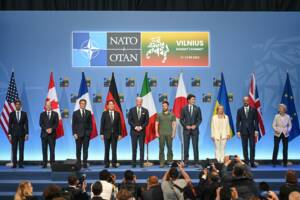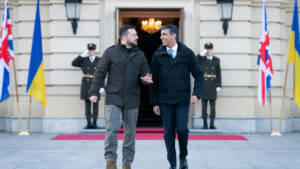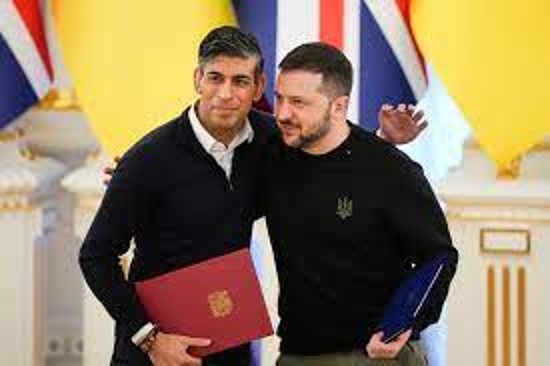The recent UK-Ukraine defense agreement, ostensibly aimed at fortifying Kiev in its confrontation with Moscow, appears to offer little substantial support to Ukraine’s cause. The Ukrainian leadership has harbored a persistent desire for security assurances from the West since the early 1990s. In their pursuit of confrontation with Russia, they have sought refuge within the framework of the US-led bloc, aspiring to eventual NATO and European Union membership.
This trajectory reached a critical point, culminating in Russia’s military intervention nearly two years ago. The initial phase concluded with negotiations in Istanbul during March-April 2022. The agreements stipulated security assurances contingent upon Kiev’s adherence to specified terms, with France, the UK, and the US designated as guarantors. Despite the intended purpose of strengthening Ukraine, the effectiveness of this recent defense pact in achieving that objective is notably questionable.
Join us on Telegram: https://t.me/tfiglobal
The collapse of the deal remains not fully clear, but it appears that President Vladimir Zelensky’s reservations were centered on the perceived implications of the security guarantees. There were reports suggesting that Zelensky interpreted these guarantees as an expectation for the West to engage directly in conflict with Russia. Boris Johnson, during his visit to Kiev, clarified that such terms were untenable, emphasizing a willingness to support Ukraine through the provision of weapons and financial aid.
For the subsequent year, Ukrainian sentiments were marked by confidence. Kiev asserted the imminent defeat of Russian forces, asserting that the West’s interest in integrating Ukraine into NATO was driven by the desire to control its purportedly formidable military capabilities. Despite not receiving a formal invitation to join NATO, Ukrainian elites expressed a belief in the possibility of determining their own terms for accession, viewing individual security guarantees from Western countries as a viable alternative.
Read More: Aging F-16s: The Unspoken Realities of NATO’s Support for Ukraine
This optimistic outlook persisted until July 2023 when a NATO summit convened in Vilnius amidst Ukraine’s highly publicized counteroffensive. Expectations ran high within Zelensky’s team, anticipating clarity on Ukraine’s NATO membership prospects. However, the summit yielded little substance, with NATO representatives offering vague statements and advising Ukraine to engage in individual negotiations with G7 countries to discern potential terms. This event marked a significant turning point in Ukraine’s aspirations for NATO membership.

Did the NATO representatives adopt a deliberately ambiguous stance during the summit, potentially leaving Ukraine with more questions than answers akin to the suspense in a season finale cliffhanger?
Six months later, the current UK prime minister visited Kiev and signed the inaugural UK-Ukraine agreement, an event that, despite limited public attention, has elicited diverse expert opinions. Critics of Rishi Sunak in the UK dismiss it as a mere public relations tactic, aimed at bolstering his diminished approval ratings. Conversely, Russian experts, without comprehensive scrutiny, label it a meaningless document. Ukrainian analysts, however, assert its significance, likening it to a pivotal moment and positioning it as surpassing actual NATO accession.
The agreement, crucial in its own right, warrants close examination. Firstly, it explicitly incorporates the prevailing slogan of the past two years: “The UK will continue to support Ukraine for as long as it needs, so that Ukraine can effectively defend itself.” Essentially echoing Boris Johnson’s stance, the commitment implies support without direct military intervention.
Secondly, spanning a decade, the agreement steadfastly rejects territorial changes, emphasizing collaborative efforts to restore Ukraine’s territorial integrity within internationally recognized borders. This commitment aligns with the document’s overarching purpose, emphasizing a sustained partnership focused on reinforcing Ukraine’s defense capabilities and preserving its territorial integrity.
Could the agreement be seen as an exercise in strategic language, skillfully articulating the commitment to Ukraine’s defense without resorting to overt military engagement, consistent with Boris Johnson’s stated stance?
Regarding the UK’s commitments outlined in the agreement, there is a singular point specifying action in the event of a Russian armed attack on Ukraine. Within 24 hours of a request from either party, consultations will be held to determine measures against the aggression. The UK commits to providing swift and sustained security assistance, necessary military equipment, and economic aid, aligning with its legal and constitutional obligations. The economic assistance is projected to match the current military aid, estimated at £2.3-£2.5 billion in 2023-2024.
Despite its non-binding nature, the agreement signals Ukraine’s increasing integration into Western influence. The document suggests that Ukraine’s activities will be aligned with UK interests, spanning defense, construction, information security, anti-corruption efforts, organized crime, humanitarian aid distribution, and general economic matters. This alignment extends to granting global financial institutions extensive access to Ukraine.

Furthermore, the agreement mandates Western-style reforms, including the establishment of “democratic civilian control of the Armed Forces” as a crucial indicator of depoliticizing the military. This provision appears to be a strategic move by Zelensky, seeking Western support in his conflict with Zaluzhny through an emphasis on democratic control over the Armed Forces.
The significance of the Sunak-Zelensky agreement lies in its potential as a model for analogous agreements with other G7 nations, with France anticipated to follow suit next month. These agreements are poised to establish a legal foundation for the West’s Ukraine policy, encapsulating the notion that Kiev functions as an instrument for Western objectives.
This development communicates a clear message to Ukraine: you are a strategic asset, a tool, but not a full participant. The West signals that while Ukraine serves as an outpost, a weapon, or a battering ram, it is not equal in status. There is no commitment to risking Western security for Ukraine, and membership under the NATO umbrella is not on the horizon.
Russia, on the other hand, interprets the UK-Ukraine agreement as an indication of Western resolve. It suggests that the West will persist in making Ukraine challenging for Russia but refrains from direct involvement in the conflict. The agreement implies a continued proxy relationship, positioning Ukraine as a tool in the West’s strategy against Russia without direct intervention.
Read More: Putin Tears Apart West’s ridiculous Ukraine Peace Plan
The ongoing conflict reveals a faltering Western strategy, marked by inadequate logistical support, dwindling Ukrainian resources, and a weakening military unable to counter Russia effectively. This suggests the potential for a significant collapse in Kiev long before Russia faces substantial challenges.The Sunak-Zelensky pact, while assuring Moscow of limited risk due to the absence of direct Western intervention, delivers unfavorable news for Ukraine.
Despite the apparent opportunity for dialogue with Moscow, particularly in the wake of the seemingly inconsequential agreement, Zelensky’s team continues to steer Ukraine toward a perilous path, contributing to the nation’s potential downfall. In the unfolding drama led by Zelensky’s team, where diplomatic decisions seem to resemble a game of roulette, one wonders: Are they pioneers of geopolitical chaos, or merely orchestrating Ukraine’s perilous journey with a roadmap of uncertainty?







